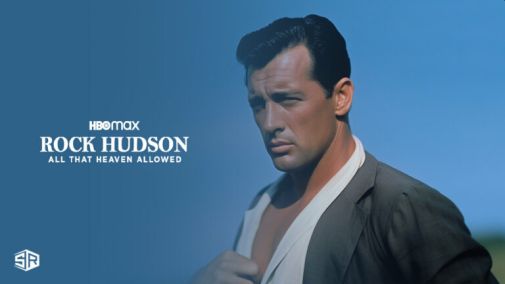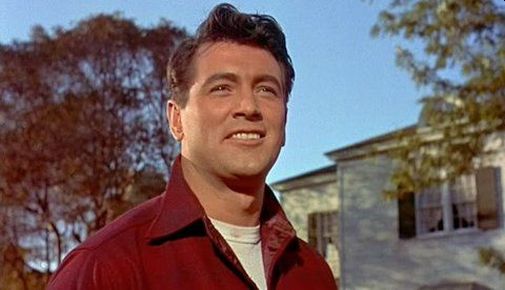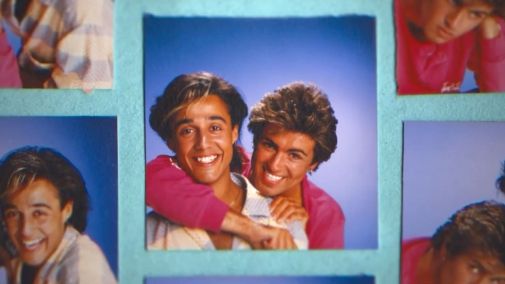Doc Corner: 'Rock Hudson: All That Heaven Allowed' and 'Wham!'
 Saturday, July 8, 2023 at 5:00PM
Saturday, July 8, 2023 at 5:00PM 
Rock Hudson’s story has been told many times either through his films, or more broadly, alongside Old Hollywood tales. Other times, it’s been shared through the stories of his collaborators and closefriends such as Doris Day or Elizabeth Taylor. Most prominently to modern audiences, the story of Rock Hudson has been told through the larger stories of AIDS and the inadvertent role that Hudson would play there as the first famous person to openly reveal they had acquired it in the mid 1980s. It is nice then to see him get the story all to himself, this time, in a film that celebrates rather than mourns...
Rock Hudson: All That Heaven Allows initially doesn’t look to be doing too much outside of the ordinary for this sort of documentary. It’s another birth-to-death narrative of a well-known figure featuring famous and not-so-famous friends and family discussing his life and career. But there’s more to Stephen Kijak’s documentary that gives it a certain vibrant and necessary energy.
Born Roy Harold Scherer Jr., he was given the name Rock Hudson by a (predatory) agent who used sex with male clients to gain leverage in their careers (though sometimes that leverage was reciprocal). Rock started in small beefcake roles before finding significant attention and fame in Douglas Sirk’s Magnificent Obsession and the movie that gives this doc its name, All That Heaven Allows. Later his most famous features were the Oscar-nominated Giant with Elizabeth Taylor and James Dean, collaborations with Doris Day and a noteworthy against-type role in John Frankenheimer’s Seconds. A Hollywood icon the likes of which could genuinely exemplify those very words, Hudson was also gay—a fact known to many in the industry, but kept private to legions of moviegoing fans.

The doc acts as both a career retrospective as well as a biography of his personal life. He was considered a movie star first and a great actor second. And he was a great movie star, handsome and fit in ways that America was wanting in a post-WWII life. But he was too early for the generational shift in acting that came with the likes of Marlon Brando and his aforementioned Giant co-star Dean, therefore left to be a matinee hunk who struggled to break out of the boxes he’d been assigned.
The editing here is fun, although it does mimic some of the choices that featured so prominently and so memorably in Mark Rappaport’s Rock Hudson’s Home Movies. That film from 1992 (which I looked at last year for its 30th anniversary rerelease) used clips from Hudson’s movies to show how the star’s sexuality was used by Hollywood for narrative gain, throwing untold numbers of double entendres and subtext innuendo. There, Rappaport used this device to comment on Hollywood and its treatment of Hudson. Here, Kijak and editor Claire Didler can’t quite capture that earlier film’s giddy recontextualization of Hollywood history, instead using the clips to underline the ridiculousness of the situation rather than to satirize it. Nevertheless, it’s entertaining and briskly told.
A more successful creative choice is found in the decision to only feature talking heads on screen who are other gay men. While we hear plenty of other industry voices and see more through archival footage, it is a particularly interesting choice that thoroughly connects the star to his homosexuality. He, from just about everything we can gather, was not ashamed of being gay, and never appeared to use the sort of language to describe himself that some did then and continue to decades later. The filmmaking choices underline this. Rock Hudson was gay and he enjoyed it. It’s a sense of pride that comes through in the movie and it’s the sort of thing that makes All That Heaven Allowed stand as a necessary work that goes beyond some of the more standard biography elements. Those more standard tropes have proven (and will continue to) give off an air of lethargy with little to separate a documentary from a glorified Wikipedia page.
Hudson’s sex life is spoken about not in hushed terms and through gossip, but plainly and directly. Often in ways that would not have been possible before, and certainly not so in the immediate time following his death. While Rock Hudson was forced to remain closeted until he was outed after his death, George Michael is somebody who was given the opportunity to experience both—although his outing came in the form an embarrassing police arrest for public indecency. Michael’s story is not the prime focus of Chris Smith’s new documentary Wham!, but the beginnings of his infamous battles with fame play an important role. So Wham! makes an interesting and surprising double feature with Rock Hudson: All That Heaven Allowed.
As effervescent in its production as Wham! were in their music, Smith’s documentary charts the bands rise to international superstardom in the 1980s. Wisely eschewing lead vocalist, writer and producer Michael’s even more incredible solo career (we’ve seen that already on film) is a smart choice and allows the refined hits of Wham!’s heyday to flourish under a spotlight they rarely receive. Wham! does little outside of the box and largely sticks to playing the hits—although with such an enviably genius roster of hits, it’s hard to blame them. Yes, it's a bit like reading the Wikipedia page with a Spotify playlist going in the background.

Where the doc is able to succeed is when it focuses on how Michael’s bandmate, the unfairly dismissed Andrew Ridgeley. He elevated the band to the place it needed to be as a springboard to Michael’s later success. The doc also charts the ways in which Ridgeley would take the tabloid attention away from his friend whose closeted sexuality was only going to prove more and more difficult to navigate within the public eye. I wish Smith had been a bit more stylistically playful; perhaps incorporating the scrap book storytelling element in a way that went beyond a mere bridging device. Thankfully though, Smith doesn’t treat Wham! as just the teenage dream frivolity in hyper-coloured outfits as many did at the time. Wham! treats them seriously and, like Rock Hudson, that is more than enough reason to justify the time spent reliving the halcyon days of ‘80s pop.
Release: Rock Hudson: All That Heaven Allowed is on Max. Wham! is streaming globally on Netflix.
Award chances: I’d say slight beyond niche queer and music-oriented awards.



Reader Comments (5)
I'd like to see both of these but I still don't have MAX and due to Netflix's stupid new rule on password sharing. My mother no longer has access to Netflix as my sister has stopped paying for the service for now.
I like Wham! They're fun and I love the fact that they never took themselves seriously.
Can' t wait to see the Rock Hudson doc and Wham! were distilled joy,a very good doc and glad to see a doc which doesn't dwell on the misery and rather their friendship and the brilliant music.
I love that you covered these together -- i watched them almost back-to-back and you're right about them making a surprising double feature.
Also agree with your takes almost verbatim on what's interesting and not about each of them. I really wanted more from the WHAM! doc in particular since it's such great subject matter... especially in regards to Andrew Ridgeley. You just never hear this kind of story about a famous person who seems chill about their fame kind of ending while their friend gets ever more famous.
The Wham! doc was pretty cookie-cutter but did do a reasonably good job of giving Andrew Ridgely's story an airing. Once it became clear that Michael was a rare talent while Andrew was not that, he accepted reality and was there for his friend. Andrew Ridgely definitely won at life. I wish George had too.
I love both of these films. It's still so hard to be yourself in this world, so many people will judge you if you're different. It is cinema that can reflect this complexity.